#moonlight chicken text posts
Explore tagged Tumblr posts
Text


MOONLIGHT CHICKEN || ep 7
#moonlight chicken#asianlgbtqdramas#thaidrama#asiandramasource#asiandramanet#earth pirapat#fourth nattawat#uncle jim#li ming#mlc#moonlight chicken text posts#moonlightchickenedit#ellisgifs#ellisedits
3K notes
·
View notes
Text



120 notes
·
View notes
Text
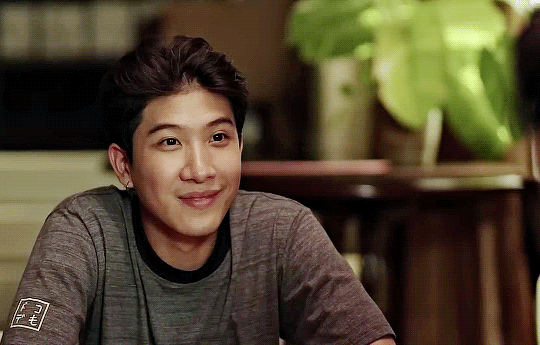

“You're a very nice kid, Gaipa.“
Moonlight Chicken (2023)
#moonlight chicken#moonlight chicken the series#jim#gaipa#earth pirapat#khaotung thanawat#mine#mygifs#x text posts#userboots#userjap#mjtag#userspicy#usermor#kiwitracks
1K notes
·
View notes
Text

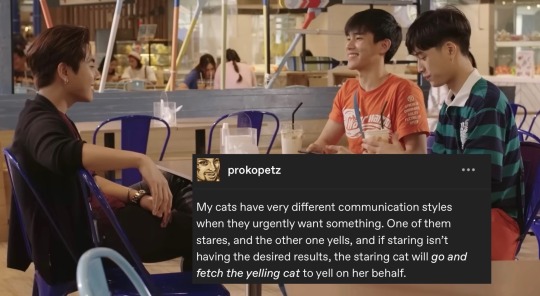



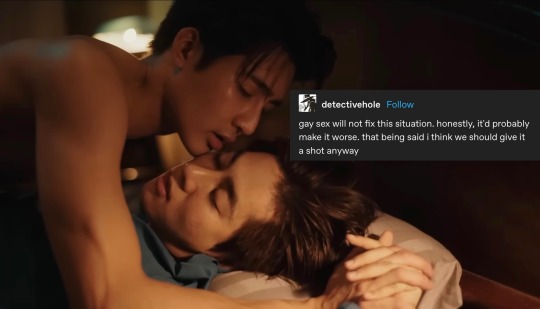


Moonlight Chicken Text Posts cuz I miss them already
#moonlight chicken#midnight series: moonlight chicken#moonlight chicken the series#mlc#uncle Jim#limingheart#li Ming#heart x liming#liming x heart#jimwen#thai bl#gmmtv#fourth nattawat#gemini norawit#earth pirapat#mixxiw#mix sahaphap#text posts#text post#mlc crack#moonlight chicken text post#mlc text post#geminifourth#earthmix
341 notes
·
View notes
Text
When Uncle Jim said something like ‘let’s not become the adults we hated’ to his sister in Moonlight Chicken that hit hard. It’s something I have to check in with myself about, from time to time, and more frequently the older I get
#moonlight chicken#life and stuff#text post#idk I just think about that line a lot#and how he’s like really reflected on how he acted and what wen said to him and idk#or is it the adults we ran away from???#I literally watched it just a few weeks ago lol#Lazzarella watches tv
3 notes
·
View notes
Photo



Peep Show quotes + Moonlight Chicken
#moonlight chicken#bl text post#moonlight chicken gaipa#beam moonlight chicken#jimwen#incorrect bl quotes
22 notes
·
View notes
Text
still cannot believe we’re seeing the end of my school president, the warp effect, never let me go, and moonlight chicken all right now in the span of like. a week
#and gap the series just ended a few weeks ago too#truly loss after loss for the community#my school president#never let me go#the warp effect#gap the series#moonlight chicken#text post#mine#gmmtv
39 notes
·
View notes
Text
moonlight chicken will fill my fourth gemini void until fridays when my school president is back :,) so happy
#moonlight chicken#moonlight chicken ramblings#moonlight chicken bl#my school president ramblings#my school president the series#my school president#moonlight chicken the series#thai bl#bl ramblings#bl drama#text post#ramblings
21 notes
·
View notes
Text
How to fall for thai BL series in 3 acts (my experience):
Act 1: I'm so bored so I start looking for drama recommendations (enemies to lovers) in YouTube
Act 2: Found a thai series that catches my attention mostly because one of the leads kinda resembles japanese idol Shigeoka Daiki. Evidence here:
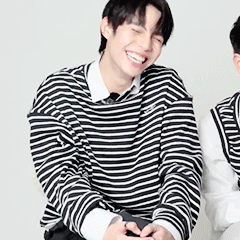
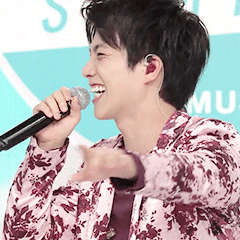
Left: an embarrassed First Kanaphan. Right: an embarrassed Shigeoka Daiki. XD (god, they could be twins :ppp)
Act 3: Become obsessed with First Kanaphan and Khaotung Thanawat, watch their other series, meet other gmmtv actors, also become obsessed with them, also watch their other series and it becomes a neverending cycle and I still can't get out of it (not that I want to, though)
Anyway, the series that had left me quite an impression until now are these (in non particular order):
The Eclipse: obviously, but not only because of Khaotung and First insane chemistry but akkayan wholesome relationship and the sutile way the characters start to grow right in front of our eyes since episode one. There's something in the way Ayan and Akk hate each other at first because of their different ideals and values, but as they start to know each other (through their confrontations) something clicks within them and start to recognize themselves in the other one. The way Akk starts to question his beliefs and the way Ayan start to soften himself, the way he is so patient with Akk and the way they care about each other, "You are allowed to be weak, at least with me" will be forever engraved within me... who would have imagined they used to hate each other? They both have so much to learn from each other and both have the same patience to wait for the other. They are literally the cutest couple I've seen and have become my safe place. Btw, this is the series I rewatch the most lol
Not Me: a friend of mine recommended this one to me because I told her I liked First in The Eclipse so of course while watching it I started looking up for First but A SAVAGE GUN ATTHAPHAN appeared on my screen. That person really amazed me with his portraying of the twins, and become an instant favorite. The way he changed his voice, the manerisms, everything 👌. Of course this drama is 10/10 not only acting wise but plot wise and the way they manage certain social and political issues. I loved every single one of the characters of the gang, their camadery, their drive, even their individual matters were realistic and valid and we can easily relate. And yes one more time I have to mention First because here's when realized how good actor he is, this series was way before the eclipse where he was a highschool student but in not me he looked older, more confident and an entire new persona. I love him.
Theory of Love: I do not remember if I saw this one right after Not Me but oh how I suffered with Third and Khai story. From a person who loves angst, tears, hearbreaks, drama and rom-coms, Theory of Love is perfect. Starting with how the first half it's form Third's perspective and the second half from Khai's perspective, a reference from "Flipped" (Third's favorite movie) and how each one of the episodes are named after a popular rom-com movie (they're film students). I admit I saw myself a little in Third since I was in his same situation when I was in highschool (in love with our best friend) so it was SO frustrating seeing him suffering for someone who doesn't deserve a single tear and only hurts you but at least Khai proves us wrong (???) One more time I fell for Gun Atthaphan acting skills (my boy cried his tears out in this one) and Off Jumpol made me hate Khai so much until the second half. I really, reeeally love how this series is delievered and would like to buy the DVD lol.
Tonhon Chonlatee: YESSS THE INFAMOUS ONE LMAO 🙉🙈, I think it's really not necessary to mention the second hand embarrassement this series gave me at some points (the very first scene lmao and the ones that came after) and how bad some issues were handled but I would like to thank Tonhon Chonlatee for giving me a whole new perspective of the kind of actor Khaotung Thanawat is. He's so versatile. I think this was his first main role in a series ??? Chonlatee is a very shy and sweet hometown boy in love with his neighbor since childhood he has a pure heart but also knows how to stand up for himself. The contrast between Chon and confident troublemaker Ayan in The Eclipse still amazes me really. Another thing I loved about this series were the girls in Chonlatee life: his mom who always gives the best advices to his son, Pang, his best friend who deserves the title of best best friend and Miriam his roomate who was there to support him. Love them.
Moonlight Chicken: The earthmix is earthmixing (lmao I had to say that xd) Anyway, this one is love in different stages of life and we love that. Earthmix chemistry is no joke, their scenes together in ep 1 some made me melt of cuteness, other some made me 🙉🙈 There's something about them idk how to explain, they give a "mature" vibe which made them perfect for Uncle Jim and Wen. Funny how I started hating Wen because I thought he was cheating his boyfriend Alan (First my beloved again) but ended up being my fav character. About Gemini and Fourth this was also my introduction to them AND THEY WERE THE CUTEST in charge of the youth, the pure love between a deaf rich boy and a poor boy. they really are the cutest 😩💕. As for my beloved Khaotung and his character Gaipa in here, what can I say? Again he surprised me with his acting skills, he's just too good at delievering emotions. Of course First my beloved was super serious and grumpy here and I really missed his smile but he did a good job portrying alan. Love them.
#thank you for coming to my ted talk#thai series#omggg i totally forgot bad buddy#i'll probably add that one later#btw I'm currently watching a tale of thousand stars#as i said the earthmix is earthmixing ;)#thai bl#the eclipse#not me series#theory of love#tonhon chonlatee#moonlight chicken#first kanaphan#khaotung thanawat#text post
18 notes
·
View notes
Text
And I personally think that the younger generations, represented by li ming here are actually questioning a lot of those cultural obligations, especially wrt those who have not had good parents.
It might not make too much sense but the things li ming is saying is actually something that a lot of the people my age i know irl often speak about, at least with our own friend groups.
Like for someone with toxic parents, how it's ok to NOT love them, and how even though the elders are well, our elders, they don't deserve to be loved and respected if they HAVE NOT EARNED IT. This especially goes to those who've hurt us in some way or the other.
Oh my EFF, where DO I START. Moonlight Chicken, episode 7 thoughts and impressions. But first, a question for the family:
Did any of you notice the filming style slightly change during the condo/living room scene with Jim and Wen (after Jim put on the chicken shirt), and the second scene with Jam and Li Ming, when they’re eating the ginger stir-fry? In both scenes, I noticed that the camera pans were a bit more fast/jerky between characters, and that Jim and Jam (#jimjam) were filmed from the chest up. I wish I knew more about cinematography, but it seemed to me that the other shots throughout the show were wider and taller. I don’t know if this means anything to anyone, but if it does, I would love to hear thoughts on it. I feel like the shooting style gave those scenes some kind of different old-school flavor.
1) JUST GAAAAAAAHHHHHHHHHH WHY IS THIS SHOW SO GOOD. Sorry for the yelling, but now I know, I KNOW, full-bodied, there is no way one post is enough for each of these episodes, so just expect a whole freaking unspooling over the weekend. ANYWAY. I’ll try to organize the quick thoughts first, then the deep thoughts.
2) Just get First and Khao together again already! They can’t help their chemistry to be ridiculously great. AND HOW GOOD IS FIRST. HOW GOOD IS HE. Just knowing when to fume just slightly, when to pull back for the sake of a scene. AND HOW GOOD IS KHAOTUNG. God. His crying! It took me OUT. Tears over here, streaming tears.
3) Speaking of hearts aching, I cried not only during the funeral scene because of Khao, but because I love this now-repeating motif that Aof uses of bringing a song that’s sung in the show as music for the background of the show, à la Bad Buddy. To think of every step of art to weave into a drama to keep you fully connected – it’s really beautiful to me.
4) Mark/Leng with his UCLA jacket, what up, Cali, cute cute. (By the way, I’m missing View/Praew. She was incredible in 10 Years Ticket, and I think she could have lent her brilliance to MC. I’m going to add The Shipper to my list for First/Ohm/View.)
5) The continued motif of showing the cast participating in time-honored spiritual rituals. As sad as it sounds, I love funeral scenes and the way a temple brings together a community. Even Wen working at the temple – it’s very real (at least at the Indian/Asian funerals I saw as a kid) to basically have a lot of the funeral feel like a community get-together.
6) Heart joining Li Ming to hand out drinks at the temple just messed me up. It messed me up good. When the young adults automatically help out at events without being told by their parents. It means a lot in Asian societies.
7) Deeper thoughts. @wen-kexing-apologist hit on this in their BEAUTIFUL POST about the show being centered on parent-child relationships. There’s a lot here in this episode, I may not get to it all.
Here’s how I’d break it down (and this post by @justafriend-ql covers so much so well):
a) Jam comes back after years of not seeing Li Ming b) Li Ming is OBLIGATED, by UNSPOKEN CULTURAL RULES, to continue to respect her as a parent c) Li Ming, clearly, wants fucking none of it d) Li Ming/Fourth EMANATES distaste for what he’s dealing with e) Li Ming STILL has to control himself around his mom who moved him aside to live her life f) He has to ALSO DEAL with his uncle, who (yes, hypocritically) (but also hypothetically) asks him why he’s gay g) So Li Ming has to also deal with his uncle’s internalized homophobia and old-fashioned views on gays in society, which may very well arise in part from his upbringing in rural Isaan h) Jim has to also deal with his sister’s guilt over not having been a mom, and her trying to sort of half-heartedly show up (until the last scene with them, which I think was meant as a symbol that there might be healing happening among the three), and i) Jim beginning to see Li Ming for the adult that he is becoming.
@justafriend-ql covered in their two posts about Li Ming the sheer SIMMERING, the shimmering ANGER that Fourth portrayed, and I felt @wen-kexing-apologist’s pain in my bones when I watched those scenes.
So much of what I am loving about Aof’s work as I enjoy my ride through his oeuvre is this family dissection – the microscopic examination of the painful aftereffects of holistic filial piety (COUGH Bad Buddy) – and I can never say enough how important his family art work is to Asian audiences. When I see these scenes of young adults holding themselves back with every iota of their energy to not JUMP KICK their parents when they’re acting stupid – man, I feel that so hard.
Jam coming back and asking for Li Ming is just lame, and we all know it, and Li Ming knows it. And yet, he is BOUND by CULTURAL PRACTICE – cultural rules that even JIM REFERENCES – to need to hold back and respect his mother, because that’s what Thai cultural boundaries demand. So I agree with @justafriend-ql that what Fourth radiated was beyond brilliant. As a viewer, I really want to see Li Ming’s gates open and to see him rage, because my inner child wants to rage right along with him.
But that night scene with Jim and Li Ming, man.

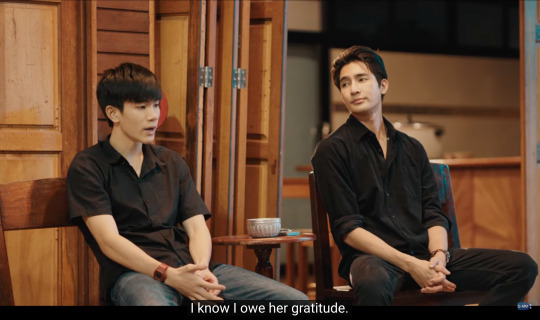

I think this bit of this scene is what ended up helping Jim to relax, and to see Li Ming as an adult.
I am loving how Jim is written. The constant, CONSTANT pull between old values and new. This scene so beautifully depicted Jim in that balancing struggle.
Li Ming is just pulling Jim along to the light of the future, as children/young adults do. Li Ming NEEDS his uncle to see HIMSELF (Jim) in Li Ming. And I think that’s what’s happening, in part, in this scene. Jim sees that Li Ming CAN understand how complicated the world is around him. Jim SEES that Li Ming is a CRITICAL THINKER.
Jim has been a solo parent for so long. He’s worried about his kid. They’re poor. His kid’s gay. Jim’s worried about his kid being poor and gay. Jim expresses it, at first, in an old-fashioned, shouting, angry way. Jim accidentally outs Li Ming to Jam.
And then. The two guys – the guys – sit with each other, rest and wash in the process of mourning an important member in the community. Jim tries to hear Li Ming at Li Ming’s level. And Jim finds that he can hear.
And maybe, even, Jim is beginning to learn that he can transcend those old-fashioned values – those UNSPOKEN CULTURAL RULES that still bind much of Li Ming’s behavior towards his mother – to be a model for Li Ming, AND TO HIMSELF, to live a hopefully more fulfilling life. (I think that might be what’s happening, in part, with the cancellation of the diner’s lease at the end of the episode – but the preview for the finale has me wondering if I’m right.)
8) I don’t know how much I have left, but I took these screenshots to also talk about Jim’s internalized homophobia. I think I’ve covered it already in my Li Ming analysis, but come AWN, just look at this SASS BUCKET OVER HERE:
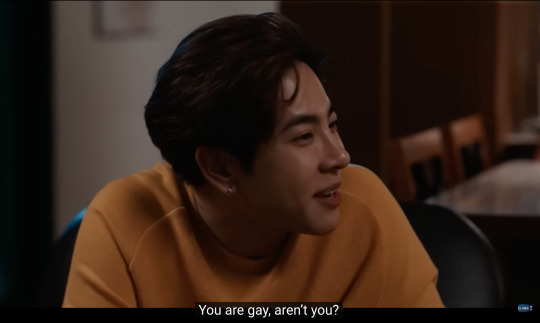
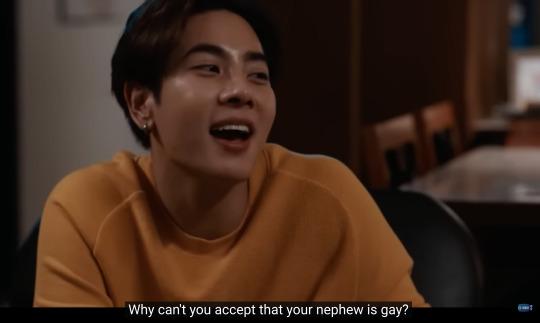

I took these to confirm that Jim was “just being a dad” (ugh) in the moment of him yelling at Li Ming, but I think Jim redeemed himself with that night chat with Li Ming. So I’m just gonna leave these screenshots here BECAUSE COULD WEN/MIX BE ANY MORE SASSY?
I’m already missing these guys. I need Our Skyy 2 REALLY SOON.
I’m gonna need a lot of sleep tonight to manage tomorrow.
#i love this post!!!!#moonlight chicken#i love p'aof for including all of these depictions of the various generations nd their attitudes#it's hard to like explain this coherently in text#but i feel SEEN
69 notes
·
View notes
Text
LAST TWILIGHT AND READING THE SUNSET – VISUALS, OPTICS AND ENDINGS IN BONDAGE TO THE BAHT

Last Twilight aired its final episode on Friday 26 January 2024, and the response on BL Tumblr to how things wrapped up (at least among the majority of BL watchers whom I follow) has been a lot of head-shaking disappointment, if not exactly full-on hatred. Without the bittersweet touches we've come to expect from Director Aof as counterballast for his trademark uplifting sentimentality, the ending came across as unforgivably sappy and sugary-sweet for many of us.
And I found myself agreeing with a lot of the criticism being flung at Last Twilight – for the ardent Noppharnachionados accustomed to more nuanced, thought-provoking output from Director Aof (Moonlight Chicken comes immediately to mind) the final episode of Last Twilight (and especially the fourth instalment, Part [4/4]) felt very boxer-gloved, rushing to hit its marks but then only clobbering bluntly at the surface, never venturing deeper and lacking subtlety at every turn.
But I've been giving it a once-over, because it's a little surprising to me that Khun Noppharnach (who's such an expert at his craft) could land quite the dud that some, including me, were so uncharitably calling Last Twilight.
And I now think – as Khun Noppharnach has done so many times before – he may very well be trolling us again. Because on my rewatch, I'm finding that the narrative holds certain clues that Director Aof was possibly quite conscious of what he was doing with Ep.12 of Last Twilight. On closer inspection it's a whole lot cleverer than it seems (maybe a bit too clever for its own good) – but it does require much sign-reading though (and caveat: I'm not a trained or professional tea leaf reader!). 🤷♂️
Anyway, after a speed-run rewatch of the 12 episodes (just skimming the surface really, so forgive me if I overlook anything) I've decided I need to reconsider a lot of my preliminary judgement about Last Twilight's final episode (and the series in general). I now think it actually does satisfy on a number of levels (even while it continues to disappoint on so many others). But because of work and other commitments though, this post is very late (still, better late than never I guess!)
I'm not wanting to spend too much time on the text and subtext, because it's the metatextual level of Last Twilight (what this BL says about BL) that intrigues me the most. But this is going to be a super-long post anyway.
In many ways Last Twilight was a departure from Director Aof's usual work, and the most obvious was its return to the structure and content typical of a traditional romance drama. Khun Noppharnach had actually moved away from this in his output over the past few years (once again, Moonlight Chicken is the paragon of examples; Bad Buddy nodded at this, if only to subvert it and signal to us that Khun Noppharnach was attempting an overhaul of LGBTQ+ depictions in the BL industry).
Some background to start things off – BL, including Thai BL, owes a lot to het romance dramas that set the archetypal framework early on, and early BLs often followed that inherited formula very closely (I think SOTUS and Together with Me fit this bill).
Painting with the broadest of brushstrokes, a stereotypical (het) romance drama can usually be expected to structure its narrative according to the following:
The meeting of the protagonists, usually a fraught mix of attraction and friction;
They go on a journey of falling in love with each other (and we get to watch along);
A major conflict arises to test their love and commitment;
They triumph over the conflict and end up happily ever after (most of the time) or are overcome by it (and the love story ends tragically, some of the time).
As a lot of romance stories are targeted at women, typically the female protagonist in a het romance drama is the center of attention, and the story is told from her point of view as well.
And because of their het predecessors, early BLs also tended to depict their couples with a masculine/feminine framing (which could also be spun out into a dominant/submissive and/or active/passive dynamic – the dreaded seme/uke binary).
Director Aof took a wrecking ball to all that with Bad Buddy (upending the structure, subverting the conflict, dispensing with seme/uke), and his works have since veered toward more-rounded LGBTQ+ drama, centered around romance, but forgoing the stereotypical structure and beats of more traditional romance dramas.
But if you think about it, Last Twilight actually hews quite closely back to the original template.
For example, Mhok is a big, scruffy ex-convict and mechanic, stereotypically masculine – the proverbial seme – while Day is slighter, younger and a Mama's boy (despite what Night says at Ep.10 [2/4] 16.24) leaning into uke territory.
The structure was pretty traditional as well:
The early entanglements of Mhok and Day were a mix of antagonism and attraction;
They went on a journey of falling in love with each other despite their differences, that we were allowed to witness – we had "masculine" Mhok losing his heart to "feminine" Day first, with the seme then pursuing his grumpy uke (a tsundere?) and subjecting us to plenty of swoonworthy Aaaaw moments as Mhok piled on much tenderness, care and affection;
The major conflict that tested their love and commitment was actually Day's questioning of Mhok's motivations, leading to their rupture in the clichéd Episode 11 of Doom;
They triumphed over the conflict after Mhok returned and demonstrated that he'd grown and learnt his lessons in meeting Day's less visible needs – not very convincingly though (and I think this is one part where a lot of us feel extremely let down by the narrative) – but it was enough to sweep Day off his feet once again, and they got their happily ever after.
There was some padding in the middle (including the obligatory out-of-town tourism jaunt – I'm convinced BLs that do this receive grants from the Tourism Authority, and in Last Twilight we were treated to a sojourn in Songkhla). The show really had to work stretching things out over 11 episodes (which was why, for me, the pacing started to drag in the second half). But overall I think the structure of Last Twilight marks a faithful return to BLs (and het romances) of older times.
With regard to characterization, Day rendered progressively hapless and helpless as his vision declined made him easy to read as a damsel-in-distress, the object of savior-knight Mhok's affections and ministrations. It's thus also unsurprising when we were shown more of Day's point of view than Mhok's (just as we usually get to see more of a heroine's interior journey in traditional het romance dramas than her romantic foil's). Last Twilight was nodding at the past once more, asking us again to view it through the lens of an old-school (BL) romance drama.
A lot of romance dramas also tend to be intellectually lightweight – some are pure sentimental, throwaway indulgence – and if we place Last Twilight somewhere on the less demanding end of the spectrum, it's a more than serviceable example of the genre and has in fact more heft than most. (I was expecting it to land more in queer drama territory as has most of Khun Noppharnach's work, and the fact that it only half did contributed a lot to my sense of disappointment at the end.)
But as a lighter piece of trad BL fluff, Last Twilight did punch above its weight class very often. And all of the discourse around vision and Day's increasing blindness was the early tip-off to one of its weightier, central themes – that of seeing and being seen in the light of one's truth.
As his vision faded, Day found himself subject to his greatest fear – of being seen as less than his truth, especially when by all accounts he had been a storied and admired athlete prior to his visual debilitation. Day was still the same person despite his loss of vision, and he was painfully reminded of this fact every time those around him forgot it. Last Twilight deftly showed us that his early snark and cynicism were a brittle defense against being seen as nothing more than an object of pity, the ghost of his former self (which is what Mee/Me in the novel Last Twilight was also about).
There are many examples of this, e.g., when he avoided his friends after blindness set in, and his meltdown at the party they threw him after a rapprochement (Ep.6 [3/4] 20.12, when it became clear they viewed him as a weakling in need of rescue at the first sign of trouble, inferior to his previous incarnation as an athletic champion). The story arc with August's feigned romantic interest was also another of Day's nightmares coming true, being exactly the sort of innocently insulting and unconsciously condescending treatment he was trying to avoid.
And of course this was the reason behind his break-up with Mhok in Episode 11, when he sensed that Mhok's care and concern were in part tied to a notion of Day as being less than whatever the nebulous concept of "normal" was in his head. (For context, Mhon and Day have an exchange about the meaning of a "normal" life for Day at Ep.10 [2/4] 7.35), Mhok talks about Day wanting to be "normal" at Ep.11 [1/4] 10.22, and Mhon reminds Day of his wish to be "normal" at Ep.12 [3/4] 16.29). Despite – or maybe because of – how objectionable the word may be, I think Last Twilight is inviting us to question our ideas about it too.)
So a large part of Day's story arc involved him overcoming his own hang-ups and dealing with how he was seen by the world around him, to stand in the light of his own truth (as a proud member of the differently abled community).
Mhok's character also had a parallel journey. Excluding those who knew him well, society refused to see beyond his rough-hewn persona (and his prison background too, it must be said). His options in life were thus limited by how he was always seen as an outsider, and subjected to othering because his presence was invariably associated with negativity, risk and harm.
But as Mhok demonstrated time and again, his truth (that for the longest time only Porjai and maybe Rung could seem to see) was far less violent and menacing than what was read by the people around him. And his character's journey toward self-actualization in Last Twilight was to arrive at a life truer to his inner self, noting that what we see at the beginning of the series is Mhok trying valiantly to live up to his ruffian image, prone to fights and aggression. With this, it's possible to read that Mhok himself was unable to comprehend fully his own inner impulses, and it was only his time as caregiver and later faen in Day's life that opened his eyes to living out his more nurturing, other-focused energy within (and that must have served him well too, in his later career as a chef crafting dishes for others to enjoy).
In contrast to Day, whose struggle was also about being seen for his truth while cast (by others) in a negative light, Mhok chose to align himself with whatever role the world put him in (whether it was a rabble-rouser mechanic, a straight boyfriend to Porjai, or a guardian to the infantilized Day) whereas Day chose to reject any outsider-determined identity outright. And Mhok failed at his roles mostly because they were inauthentic to his truth, except for his time as Day's caregiver. For the first time there Mhok's failure was different, not because the caregiving recognized his own truth (coming from kindness and softness within) but because it did not recognize Day's truth (as his approach to taking care of Day still perpetuated the invalidation of Day's wholeness as a person).
Mhok and Day's names are also a quiet hat tip to this – with Mhok's name (หมอก, that means fog or mist) also a metaphor for how visibility of the truth behind his amorphous self was obscured for the longest time, while Day's name (actually the English word day, with all its connotations of light and clarity) is a metaphor for how he was clear about his own truth and identity from the start, but needed to be seen correctly, undistorted by any filter of shame or pity.
However, GMMTV's commercial insistence on pair branding worked somewhat against the characterizations – my read is that Day was probably written as much more fragile in appearance (belying the tough athlete that he really was beyond surface impressions, and explaining the tendency of his friends, family and caregivers to want to infantilize him post-blindness). As an aside, badminton is one of those sports that forgives a certain delicacy of frame, as it rewards lightness and agility more than brute strength on the court. Meanwhile Mhok was (I think) written as this big beast of a man whose appearance would scare off all but the most foolhardy, meaning that his innate kindness and sensitivity would remain unseen by most.
Unfortunately Sea is built pretty sturdily as an actual badminton athlete (and he's tall as well) while dermatologist Jimmy is just too porcelain-skinned and delicate-featured pull off any convincing evocation of physical brutishness. Pity, because the pair do have chemistry and their acting was mostly credible in Last Twilight (especially from Sea, who brings an easy and natural charm to his portrayals).
Anyway, I can suss out two visual metaphors in the series that illustrate the ideas described above. But as the analysis of these metaphors is also long, I've moved it all away into its own post linked here: The Fishtank and the Flowers. I found both metaphors to be fascinating (the goldfish aquarium, as well as the pairing of the jasmine with the sunflower), but it was the blooms especially that took me by surprise (when it became clearer which was assigned to Mhok and which to Day). 🤩
So while we're on the characters though, here's an aside about the criticism of how Mhok was treated by the narrative and the outrage surrounding his apology at Ep.12 [2/4] 10.55. Yes, he had been a selfless caregiver and a caring lover, but there were also numerous examples of him treating Day as less than an adult with his own agency, doing to Day what August, Mhon and the replacement caregiver (Assistant Director Meng Chaiyapat's extended cameo, at Ep.10 [2/4] 0.27) had done, by controlling the playbook and removing Day's choice and say in matters directly related to his own life. Some examples of where Mhok fell short:
Pretending not to find the copy of Last Twilight in the Chatuchak secondhand bookstore, gaslighting Day into believing it was his own discovery (Ep.3 [3/4] 9.41) – you might lie to a kid about Santa Claus (and I'm divided about that), but nevertheless Day was not a kid and should not have been treated like one.
Lying about Night's involvement in their plan to see Mount Veha (Ep.8 [1/4] 17.34) – more gaslighting.
Going back on his word and telling Mhon and Night about Day winning the dancing garland (Ep.11 [4/4] 7.35) – this was just plain disrespectful, especially after Day had shared his mixed feelings about the "win" (Ep.11 [4/4] 1.45).
Taking advantage of Day's blindness to prank him (Ep.11 [3/4] 7.32 and Ep.11 [4/4] 3.38) – unless Day liked surprises (of which I see no sign) laughs derived from exploiting someone's vulnerabilities are never to be lauded (please don't jumpscare the blind, people).
And the ultimate – lying about the job offer in Hawaii, which was the last straw for Day (Ep.11 [4/4] 10.51).
All the above might have come from a place of love, motivated out of the goodness of Mhok's heart – but even if they were meant to uplift or support Day, his actions were all disrespectful (even damaging) to Day's own agency and personal situation as someone struggling with visual disability.
In this light (pun intended) I had to re-think my judgement of Mhok's apology to Day in Ep.12, because he did need to learn to care for Day on terms acceptable to Day as well, and not have expected him to give that up just because he needed care.
Now because it's Khun Noppharnach, it will always be possible to give a queer reading to his work. So Day's dread at being seen as less than what society perceives as "normal", and Mhok's struggle with his status as the feared and misunderstood "other", can both be read as stand-ins for (some parts of) the LGBTQ+ experience, where full acceptance of the queer minority has yet to become the norm for most, if not all, societies. But I guess that should be obvious to all by now.
Anyway, there's a whole lot more burbling within Last Twilight that can be explored at length, but as I've gone on too long already I'm simply going to mention them here and then skip on:
The novel Last Twilight that features so prominently everywhere within the series (that not-so-coincidentally shares its name) is rich with significance as a parallel to (and comment on) Mhok and Day's own story, especially with Mee/Me's struggle to be seen in a world often blind to her presence.

Day becoming increasingly unseen as the neverending night of blindness became his defining identity is mirrored by Mee/Me needing to step away from darkness in order to be seen by the world around her (and her light-chasing is also a parallel for the sun-seeking of the sunflower, Day's totemic bloom, and in that way another metaphor for Day's reliance on external validation – see this write-up linked here for more elaboration on that aspect of Day's personality).
Day's blindness was not at all the first time Khun Noppharnach has used a form of health-related affliction as a metaphor for the queer condition, highlighting the parallels of the LGBTQ+ experience with the social model of disability. Other examples of this in his work include Heart's deafness in Moonlight Chicken, Tian's and Med's heart conditions in A Tale of Thousand Stars and He's Coming to Me respectively (the latter maybe less so though) and Pran's obsessive-compulsive disorder in Bad Buddy.
Also in He's Coming to Me, Med's predicament as a ghost subject to all sorts of constraints in the world of the living, as well as his invisibility to those insensitive to his situation, was a parallel with Last Twilight's theme of being seen for your true self even as the wider world imposes restrictions on you, and is similarly an allegory for the LGBTQ+ experience as well.
Last Twilight's ideas about seeing and being seen correctly were also touched on (somewhat briefly) in Bad Buddy, in the discourse around Ink's camera, photography and Pat/Pa's contact lenses.
Mhok's journey was milestoned with numerous examples of the food = love trope, in which he could be seen giving of himself through the creation of dishes and meals for others.

(above) Last Twilight Ep.11 [2/4] 0.39 – Mhok's gift of Black Chicken Soup (ซุปไก่ดำมา) to Porjai is but one of many examples in the series of him showing his love to others through his cooking; in this instance Black Chicken Soup (made by double-boiling silkie chicken with medicinal herbs) is a traditional Chinese preparation, warm and comforting, that is considered particularly nourishing for moms newly post-partum and is also popular in Thailand for the same reason
This is paralleled also by Mhon and her career as a chef (especially when she ladled soup out for her ex-husband in Ep.12, which is a bittersweet Noppharnach touch with reams of cultural backstory – but that's fodder for another post though).
And Assistant Director Au Kornprom's cameo as chef-de-cuisine in Singha's hotel continues a meta-level portrayal of his role in BL as some sort of leader, instructor, teacher or creator with a select group as the intended beneficiaries of his work (see these links here and here for other examples).
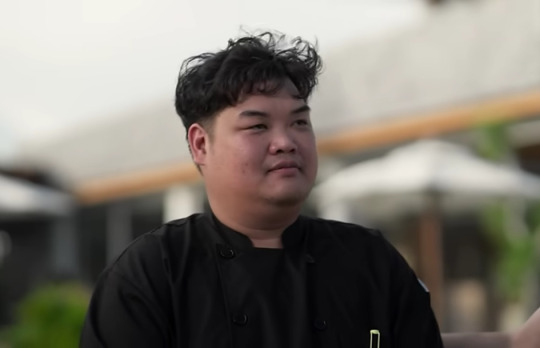
(above) Assistant Director Au Kornprom Niyomsil pops up in a cameo as Chef Tom in Last Twilight Ep.11 [2/4] 9.47
I think Director Aof is announcing that Khun Kornprom is his designated successor as the next generation BL director at GMMTV who will (perhaps) be carrying on a measure of queer activism within his own output.
And that brings me to what I think Last Twilight might be saying on a metatextual level.
What I'm going to be babbling on about here reaches not only into Last Twilight for some clues as to its comments about the wider BL industry, but also to some messaging in Khun Noppharnach's earlier (though still recent) work, because I think it all does come together to paint a picture of some significance.
In the names and chromatic metaphors of Moonlight Chicken (see this link here), Director Aof signaled that unseen persons in authority were increasingly making their political presence felt, especially where financial motivations were concerned (caveat: I think this is a reference to power play within GMMTV and perhaps the BL industry itself, not a comment on the wider political scene in Thailand).
And Director Aof's various cameos in MLC (written up here) as well as its themes of generational renewal and the struggles to leave the past behind, also seemed to be messaging that some of this conflict between artistic/activist directions and commercial considerations were possibly taking a personal toll even as he continued his career within the BL industry.
I would have left it at that, but then when the Our Skyy 2 x Bad Buddy x A Tale of Thousand Stars episodes had their turn on our screens in 2023, it became clear that Director Aof was saying something quite forcefully about the telling of queer stories in the media, especially in situations when queer people have less control over the narrative (as is the case with Y-series churned out by commercial studios for mass market consumption; see this write-up here for the analysis).
So based on the above together, this is my read of the situation.
Khun Noppharnach has been signaling that because of the profit motive, queer creators in the BL world are under increasing pressure from higher up to return to more commercially-lucrative storytelling, perhaps in the form of more stereotypical romances the way Last Twilight was structured. (Whether this pressure is from within the producing organization or from the wider political sphere I do not know nor wish to speculate.)
As a consequence, QL shows are being made to veer away from recounting stories that are authentic to the LGBTQ+ experience (which was the warning embedded in Our Skyy 2 x Bad Buddy x A Tale of Thousand Stars), dialing back content that speaks with a queer voice to queer people (though of course non-queers are welcome to watch along, because after all a good story is a good story).
If the above is true, then the tidal pull of commercial goals may soon be dragging more output back toward the more romanticized imaginings of same-sex love seen before in formulaic (but arguably more profitable) BLs of old, with an emphasis on catering to mass market demand (largely represented by – whether rightly or wrongly – marketing perceptions of the cishet female teen gaze).
And all of this circles back to Last Twilight, which is an example of this return to the past, and perhaps explains in part why its ending feels so unsatisfactory for a lot of us.
I'm very much convinced at this point that the finale (with its hated timeskip, Mhok's spiffed-up but stagey return, his emotionally hollow reconciliation with Day, and especially all the schmaltzy vignettes post-couplehood part deux) is but a conscious reaction to political gameplay from echelons above. For Last Twilight, I'm sensing (guessing?) that Director Aof and his team were coerced not just to stay faithful to the traditional formula of BLs past, but also to shove in an unmitigated Happily Ever After for the branded pair of JimmySea, without any of the hallmark Noppharnach countercurrents to undercut the sweetness (or else).
And perhaps in a burst of inspired-slash-malicious compliance, the team took on the mandate for the HEA and ran with it, churning out a saccharine, nutritionally-deficient lump of candy and unceremoniously tacking it on as the ending of what had otherwise been a fairly measured and self-aware BL from the start. And it really sticks out – but I think it was meant to.
I may be misreading the tea leaves again, but to me the signs of the above are myriad. Here's some of what I think Director Aof is telling us about Last Twilight's subversion of the ending, embedded within the narrative and visuals:
Master Aon's name is signaling (to me at least) a parallel with Director Aof's name (Aon/Aof, On/Off, Onscreen/Offscreen, get it? 😆). He even has a similar look, with his wispy mustache, earring and floppy hair.

Noting that Aon was a respected, good-natured guru who'd already trodden happily the path that Day was on, this reads like a rendering of Director Aof's own role (that I'm tempted to say is self-defined, though it's my own reading really) as a queer elder imparting the wisdom of his own experience to younger queer people viewing his work. (Also, both Aon and Aof are gurus of BL who've had their vision stolen from them.) And if Kruu Aon was recommending acolyte Day to read the novel Last Twilight for the metaphorical lessons within (we were reminded of this many times: see Ep.3 [2/4] 9.08, Ep.8 [4/4] 1.07 and Ep.9 [4/4] 9.26), I think Kruu Aof is recommending that we look at the series Last Twilight more closely as well to learn of something similar.
Last Twilight the series is full of references to endings. And if the novel Last Twilight has been signaled as the roadmap to Director Aof's thinking behind the series, the missing last page and epilogue in Day's copy suggests that – just like the book version – Last Twilight the series is actually (and deliberately) open-ended.
But the messaging doesn't just stop there. We are also called upon to manifest the ending we want (if what we're presented with doesn't meet our expectations). For example, Mhok hated the ending of Last Twilight the novel (although Day liked it –see Ep.9 [4/4] 13.23). And he then conflated this with his disappointment at the lackluster twilight on Mount Veha as well.
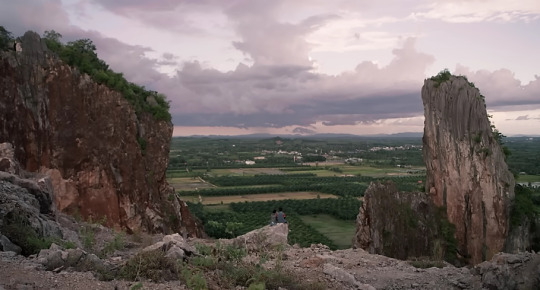
But through the power of imagination Day helped Mhok see the beauty of the sunset there (Ep.9 [4/4] 16.28) – on one level it's a trite "Life is what you make it" sort of statement, but on another it also reads like a call to action ("You can change what you don't like"). And I like to think it also embodies Last Twilight's theme of recalibrating your own way of seeing things, and looking beyond surface visuals to find the truth that speaks to you (which, in a sense, is what I'm doing now, hah!). But when applied to Last Twilight at a meta level – I think we're also being reminded that a picture-perfect ending (such as Last Twilight's Ep.12 [4/4]) can also hide the reality of gloomy clouds behind the artifice overlaid by human intervention.
Another sign that the ending of Last Twilight deserves a closer look is all the flapping about between innkeeper Cherry, Mhok and Day around the missing last page of Day's book in the Ep.9 [4/4] scene starting at timestamp 2.38.

(above) Last Twilight Ep.9 [4/4] 3.11 – Cherry tears out the last page of her copy of the novel and forces it on Mhok and Day
I'm putting in a detour for a closer look at Cherry here. She was the unsentimental custodian of her father's guesthouse, with a personality that blew hot and cold (like the weather in the south, referenced at Ep.9 [4/4] 2.12). The guesthouse seemed comfortable enough, although Mhok found it less than welcoming (Ep.9 [3/4] 6.39). And Cherry herself was also a strange mix of brusque and friendly. She was more concerned about cash than MhokDay's lack of shelter at Ep.9 [3/4] 7.36, but warmed up to them later when they explained their Mount Veha quest (allowing them to stay, treating them to a musical evening with her guitar, and accepting the payment deferral). She preferred the old way of doing things (cash only, no online transfers) and had once hosted David, the author of Last Twilight the novel, at the guesthouse.
Based on the above, I'm thinking that Cherry is a representation of Director Aof's dual role at GMMTV, where he is both a creative (director and sometime screenwriter) as well as part of management (senior director of content production, at time of writing). And in Last Twilight we see this duality acknowledged both in Cherry's mercurial double nature, as well as in the capricious weather of Songkhla. The guesthouse, on the other hand, is a representation of GMMTV itself. On the management side, Director Aof has to make and/or implement decisions on behalf of the company even though it isn't really his (just as Cherry runs what was once her dad's). GMMTV is warm and hospitable enough to the performers in its stable, but as a commercial enterprise it has to prioritize financials above most (if not all) other considerations (symbolized by the guesthouse's paradoxically comfy yet unwelcoming air, and also Cherry's indifference to MhokDay's cashless plight). Director Aof's creative focus is the arts (represented by Cherry's musical interlude) but GMMTV itself prefers the old ways of making money, i.e., old-style BLs (and this is symbolized by the guesthouse unwilling or unable to explore new ways of collecting rent with no online transfers). And just as the guesthouse hosted David, whose bittersweet ending to Last Twilight the novel wasn't satisfying to salt-of-the-earth Mhok (standing in for the tastes of the mass market), GMMTV also hosts under its roof Director Aof, the auteur behind Last Twilight the series (whose original ending I suspect may not have pleased other GMMTV bigwigs in management, and who then enforced a change). Some of this is illustrated in part by the scene just before Mhok and Day departed from the guesthouse. When Mhok and Day asked Cherry to keep her autographed copy of the novel, she instead tore out the (signed) ending from her book and thrust it into their hands. And when Day asked if it had a happy ending – she jokingly tried to grab it back, saying "Find the ending yourselves." To me this is a metaphor that the original ending of Last Twilight the series is actually unknown to us, and the ending we got was forced into the narrative from the outside (because it's what the fans want, according to GMMTV speaking in Cherry's voice at Ep.9 [4/4] 3.15 – "I think it's more important to you than me"). And it has official sanction too (symbolized by the author's signature), indicating that Director Aof (David in another incarnation) may not have had a choice (since we're shown that the author's stamp of approval was artificially inserted into a different book instead). It also suggests (in the "Find the ending yourselves") that Director Aof was aware of how that artificial transplantation was going to be negatively received by some diehard Noppharnach fans, and he's saying to us – "Take the ending that's been given you", but at the same time "Find your own meaning in it".
And then Day tells us in no uncertain terms basically the same message, at Ep.12 [4/4] 3.37 ("We were made to discover our own preferred version of the novel’s finale").
The narrative actually tells us quite boldly in the first part of Episode 12 that we can expect the finale to start unraveling because of outside interference – I actually think this is the message behind Director Aof's cameo at Ep.12 [1/4] 10.01:

Mocked up as a hotel porter, Director Aof offered a guiding hand to Day – but at timestamp 10.06 Mhok suddenly inserted himself into the scene in an act of direct supplantation:

(above) Last Twilight Ep.12 [1/4] 10.06 – Mhok steps in and supplants hotel porter Aof (he of the white gloves)
To me this was unambiguously signaling that from this point onward the proceedings would no longer be under the guiding hand of Khun Noppharnach. In addition, hotel porter Aof's gloved hands were pure white, unbesmirched and free from stain, conveying the message that Director Aof was innocent and blameless of the plot shenanigans that were to follow. To underscore the point, we were then shown Day taking a misstep under new (non-Aof) guidance at Ep.12 [1/4] 11.20:

(above) Last Twilight Ep.12 [1/4] 11.20 – Day stumbles without hotel porter Aof's guidance, even as Last Twilight the series begins to falter
This was jarringly out of tone, given Day's confidence in his life as a blind person, as well as Mhok's previous – and very conscientious – stint as caregiver to Day the first time around (he would instinctively stand between Day and any physical risk, and place a protective hand over protrusions that Day might bump his head on, for example). The message from this visually dissonant moment is that we should expect the ending to stumble as well, without Khun Noppharnach guiding the process.
So what can we make of the ending with this in mind? I can live with the timeskip, Mhok's return, and the eventual reunion of our main pair. These are all somewhat expected beats in a standard romance drama – and if that's what Last Twilight is setting itself up as, I won't begrudge it the tropey hallmarks that some do love (though I do think some parts could have been handled better). I even liked the airport run for all of its brash, silly sentimentality (yes, Love Actually is one of my favorite films).
But where I think Last Twilight really falls off a Veha cliff is when it starts lobbing at us a plethora of candy-sweet dreams unrealistically brought to life, one after another, in Ep.12 [4/4]. We have:
Ep.12 [4/4] 0.51 – Surprise! Day can see;

Ep.12 [4/4] 1.18 – Multiple scenes showing Day rejoining the world of the sighted, enjoying activities that were once denied to him (like reading and badminton) both alone and in the company of loved ones;

Ep.12 [4/4] 4.01 – Family time! Mhok introduces Day as his partner to his deceased family at their memorial niches, and then we see Mhok very much integrated into Day's family (signified by his pasta dish receiving chef Mhon's stamp of approval) even as we see Night and Porjai joyfully announcing another imminent addition to the numbers;
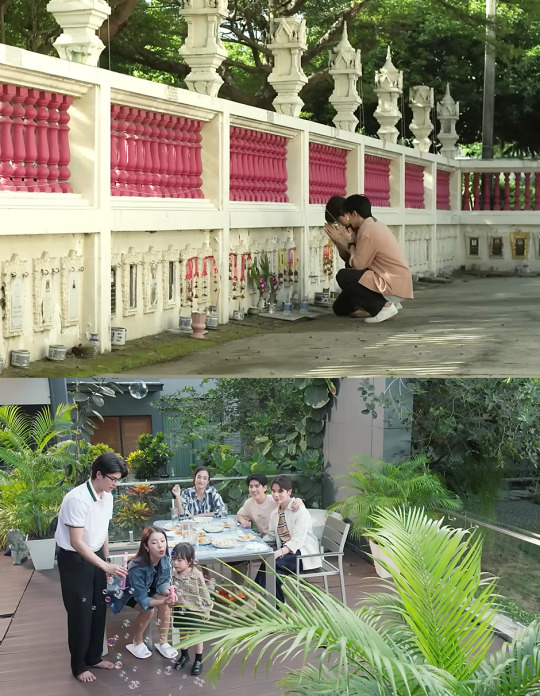
Ep.12 [4/4] 8.06 – Mhok and Day get a Mount Veha do-over, talk about the novel's ending and then act out the ending to their own love story.
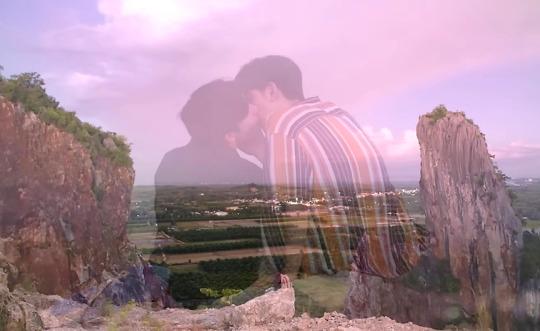
It's all just too, too fairytale, with happy news piled atop happy news, and just reeks of artificial sap and fakery.
But that's just it – I think that Director Aof and team were actually faking it. Remembering that the novel Last Twilight's full title is Last Twilight: Until the Last Light Goes Out, take a look at how each of the above little snippets of happiness is finished off – each draws to a close with its own Fade-to-Black.
Now the Fade-to-Black is a device borrowed from theater – in a stage play snuffing the lights for a few minutes of total darkness allows scenes to acquire a sense of separation, completion and closure while giving the crew time to change the sets. But here in Last Twilight it feels like we're being pitched happy ending after unrelated happy ending, each competing with the previous in the too-good-to-be-true stakes.
In the title of the novel, we're told to hold on until the last light goes out. Just when is that last light exactly though? There are so many here that each Fade-to-Black begins to feel not just like closure, but like a little death each time. (Also pertinent to note: MhokDay's kiss under that glorious sunset at Ep.12 [4/4] 13.26 gets replaced by a sky of gray clouds instead at Ep.12 [4/4] 13.37.)
Director Aof is really hammering home his point that traditional Happily Ever Afters in romance stories can be shallow and unsatisfactory, and is making us miss the trademark melancholy that propped up the wistful sentimentality in the closing scenes of his previous works.
However, much of the above is what Last Twilight is saying about Last Twilight.
At the metatextual level, what the show is communicating about BLs as a whole is even more somber. I think Director Aof is messaging that for the BL industry to head toward a happy, satisfying ending (if it really is being pushed down to lowest common denominator levels by commercial interests), it's up to us the viewers to manifest that and make it happen (just as Mee/Me and Day did for their own stories). How this might be done, I do not know. Lobbying GMMTV perhaps? Complaining ever more loudly about what this did to Last Twilight when it could have been so much more?
I rather suspect that unfortunately our numbers may not be sufficient to bring about change – the majority of Last Twilight fans actually seemed to like the final wrap-up and its fairytale ending (at least based on the reviews I've seen on MyDramaList). It's only among the more adult (and dare I say it – discerning?) viewership here in the BL sphere on Tumblr are we seeing more robust critiques of the series, mourning the greatness that could have been.
Last Twilight was a good BL all the way up to Ep.12 I think. And then it looks like we were purposely let down, to make a point about BL endings. As always, Director Aof is having the last laugh – and he lets us know this during the end credits.
For it's then that we see the various photographs that were taken by characters throughout the series but never shown to us before (it's strangely moving, and makes me think of the ending to Cinema Paradiso when Salvatore finally gets to view the priest's cut in one long montage as a final gift from Alfredo beyond the grave).

(above) The end credits of Last Twilight, replaying the scenes where the characters were photographed, alongside the images captured in the moment that hitherto were not shown to us
It's in the ending that we're finally getting to see the director's point of view (and hidden message) from his vantage point behind the camera, just as we're only getting to see those photographs (that were originally unseen by their subjects, and privy only to the one taking the photograph) right at the very end.
And the final shot? We get the whole cast and crew making the "span" gesture (that an almost-sightless Day used to approximate the distance at which he could still make things out visually, before his vision left him totally).

It's a loving salute to Last Twilight for sure, but can we perhaps detect a hint of mockery in the way it also resembles the Forehead-L for Loser gesture from the 1990s? Or a hint of a threat in the way it looks like a gun cocked and pointing? The gesture is also Thai sign language for the letter ล, which is somewhat the equivalent of the letter 'L'. And with so many 'L's or 'ล's in that shot, it's making me think of 'LOLOLOL' and also ลล standing in for ล้อเล่น/laaw len, which means Just kidding.
Is it all just a coincidence? I wouldn't put it past Aof for it not to be. But whatever it all means, I really do think he's having a hearty (if somewhat bitter) last laugh. 😔💖
#last twilight#mhokday#aof noppharnach chaiyahwimhon#reading the signs#of seeing and being seen#this is a bit of a clown post 🤡#a whole lot of speculation#and maybe some retconning#but also food for thought#finding my own version of the ending
28 notes
·
View notes
Text

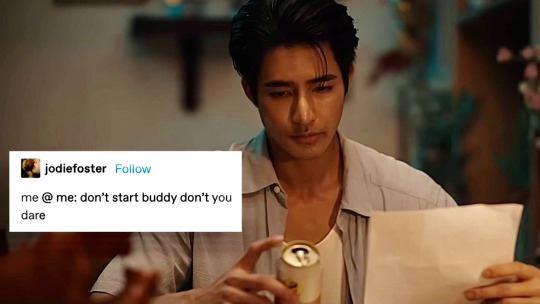

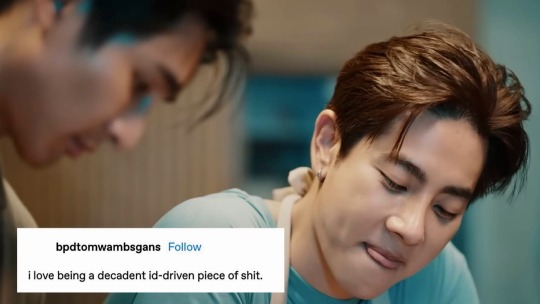

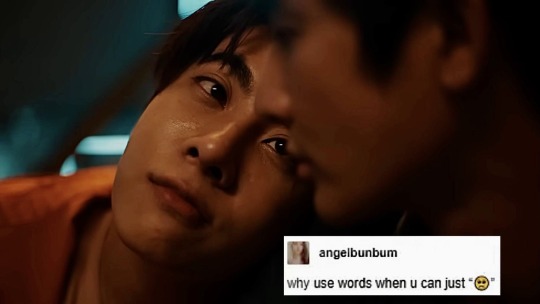
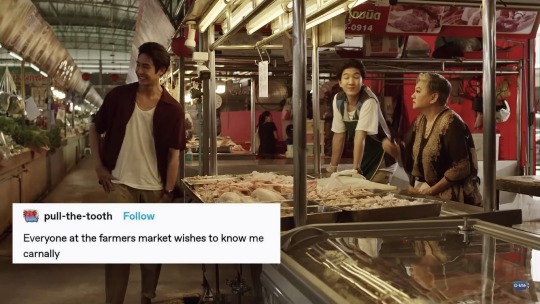


moonlight chicken as text posts (pt. 1)
#moonlight chicken#asianlgbtqdramas#thaidrama#asiandramasource#earth pirapat#mix sahaphap#jimwen#earthmix#midnight series#moonlightchickenedit#ellisedits#moonlight chicken text posts#finallyyyy earthmix chicken era 2.0 is upon us#life has been too much lately i only just managed to watch the eps today#i have brainrot now but i also desperately need sleep :(#will try to come back properly and reply to messages etc soon#🤞🤞🤞
1K notes
·
View notes
Text






#moonlight chicken#jimwen#mlc saleng#mark pakin#mlc text posts#earth pirapat#mix sahaphap#mlc jim#mlc wen
123 notes
·
View notes
Text
Fave Gifsets of 2023
I wanted to do some more gifmaker appreciation, and wanted to list some faves from 2023!!
Rules: link your favourite gifsets you reblogged from other creators this year!
yunmeng shuangjie text posts by @sandushengshou mysterious lotus casebook - i asked you not to leave by @rhymaes difanghua shenanigans by @smittenskitten something lgbt just happened by @qpjianghu nam seon ho by @highwarlockkareena the blood of youth squad by @difanghua raysand by @khaoray in my dreams i am kissing your mouth (wangxian) by @valarinde my hand was the hand that you reached for by @radishayuan xiao xingchen art by @wisesnail jiang wanyin hands by @evakant wangxian art by @mmagurro zhang ping and lan jue by @smittenskitten seonrok by @yohankang (you were insane for this one man) moonlight chicken by @wanderlust-in-my-soul lan wangji birthday set by @khaotunqs power couple wangxian by @zhanyings
tagging @highwarlockkareena @sandushengshou @evakant @gege @yibo-wang @lan-xichens @weiwuxian @morshiberna @bienmoreau @whoisthatmovinginthedark but no pressure 💙
#gifmaker appreciation#. i love you content creators this website would be nothing without us 🥰✌#r.txt
33 notes
·
View notes
Text






Moonlight Chicken as love languages
#moonlight chicken#midnight series: moonlight chicken#mlc crack#moonlight chicken the series#fourth nattawat#earth pirapat#gemini norawit#mix sahaphap#mixxiw#thai bl#Gmmtv#limingheart#jimwen#earthmix#geminifourth#uncle jim#li ming#mlc text post
120 notes
·
View notes
Text
EVERY MONTH OF 2023
Most popular & favourite set per month (if tumblr’s not going to give us our wrapped, let’s do it ourselves)
i was tagged by @loveisactivated @itsallaboutbl @i-got-the-feels @pranink & @alexshenry thank you angels!!! <3333
JANUARY:
most popular: tinn’s emotional supportive daydream
personal fave: msp text post meme
FEBRUARY:
most popular: fourth tickling gem’s chin
personal fave: moonlight chicken ep 1 photoset
MARCH:
most popular: our dating sim boyfriends era
personal fave: forcebook forehead kiss 🥰
APRIL:
most popular: the eighth sense night date
personal fave: our dating sim behind the scenes
MAY:
most popular: forcebook/geminifourth shenanigans
personal fave: our dining table hug
JUNE:
most popular: pride month celebration
personal fave: forcebook hug compilation
JULY:
most popular: topmew in the official only friends trailer
personal fave: abaab/enchanté parallel 😭😭😭
AUGUST:
most popular: mark pakin’s hilarious advice
personal fave: uranus2324 trailer
SEPTEMBER:
most popular: force being ticklish leading to the best only friends scene
personal fave: force being silly in the only friends bts
OCTOBER:
most popular: neo accidentally jump scaring force 😂
personal fave: noir version of my golden blood
NOVEMBER:
most popular: spotify shenanigans
personal fave: cooking crush episode 1
DECEMBER:
most popular: day kicking his feet while mork does his hair
personal fave: last twilight episode 8
tagging: @forcebookish @spicyvampire @guzhu-furen @sparklyeyedhimbo @mymycorrhizae @morkofday @daymork
22 notes
·
View notes